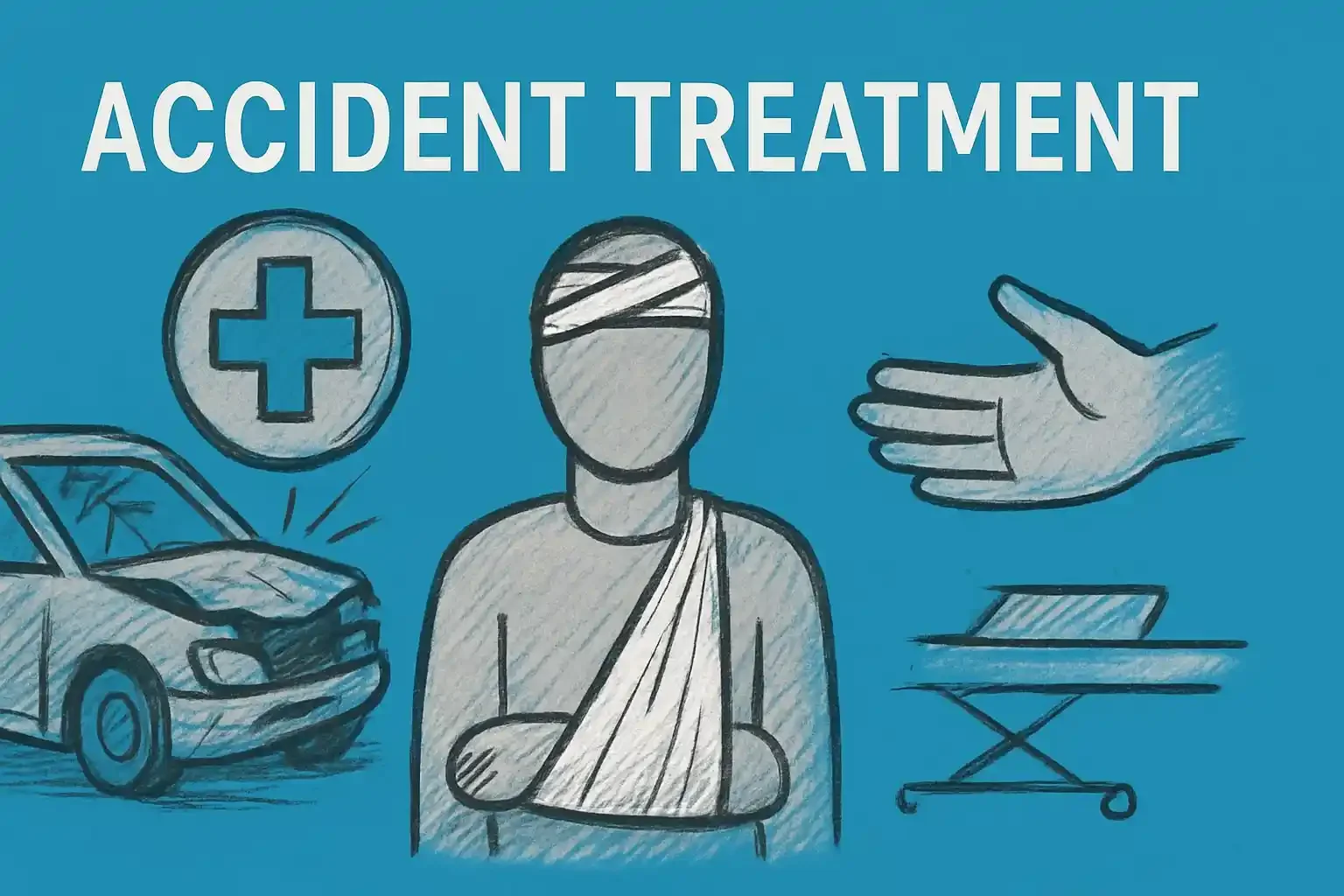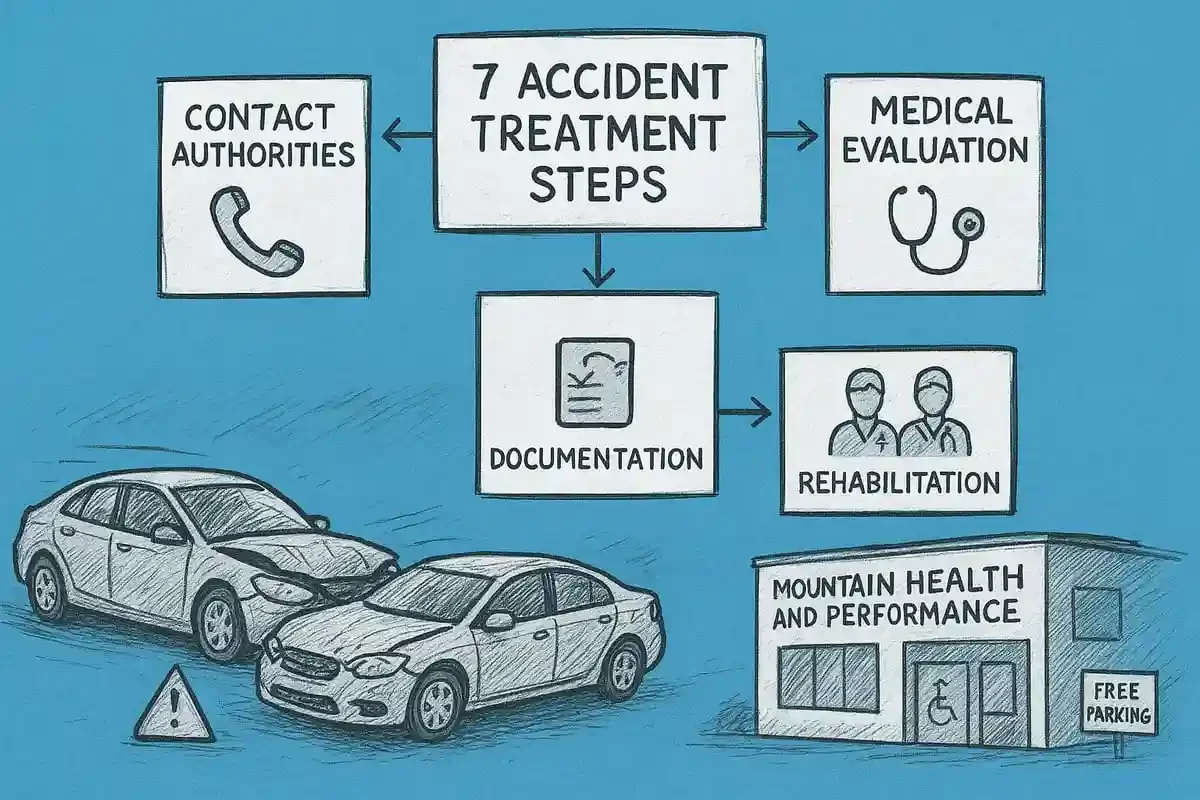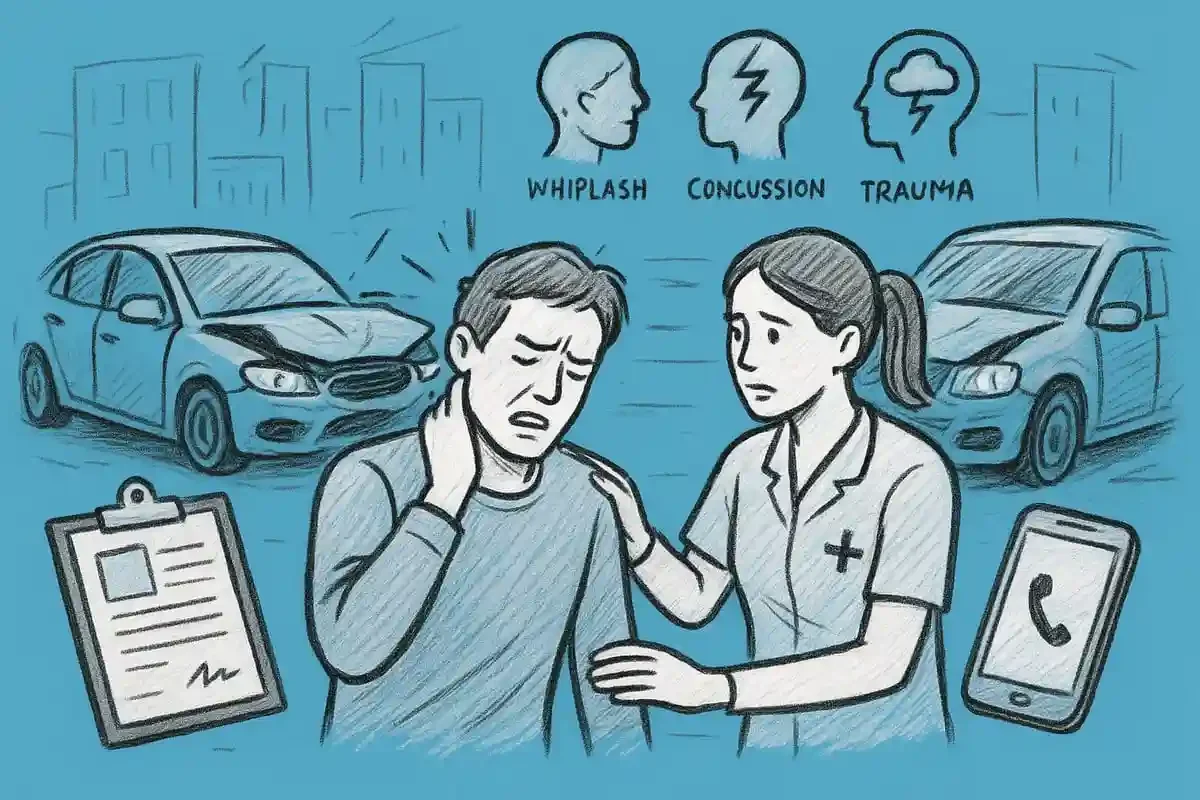7 Essential ICBC Accident Treatment Steps for 2025 and Beyond
Every year, thousands in British Columbia face the shock and confusion that follows a motor vehicle accident. The path to proper accident treatment can feel overwhelming, especially when navigating the evolving ICBC system in 2025.
Knowing exactly what to do in those first moments makes all the difference for your recovery. This article is your up-to-date guide to the 7 essential steps for accident treatment, designed to help you access care quickly, document everything, and achieve optimal results.
You will learn the best immediate actions, how to connect with trusted clinics like Mountain Health and Performance, and the most effective strategies for both physical and emotional rehabilitation. If you want clarity and confidence after an accident, start with these proven steps.
Understanding Motor Vehicle Accident Injuries in 2025
Navigating motor vehicle accidents in 2025 means facing a rapidly changing landscape of injuries and accident treatment strategies. ICBC regularly changes their coverage and claims process, making it crucial to stay informed and proactive about accident treatment availability from the very start.
The Evolving Landscape of Accident Injuries
In 2025, the most common injuries from motor vehicle accidents include whiplash, soft tissue damage, fractures, concussions, and psychological trauma. Whiplash and soft tissue injuries remain prevalent, especially with the continued rise in rear-end collisions. Fractures and concussions are also being reported more frequently, partly due to the increased use of mobile devices while driving.
Distracted driving continues to be a major contributor to accident rates. Recent data reveals that nearly 12 out of every 1,000 people visit the emergency room each year for crash-related injuries (CDC, 2024). This rise in incidents directly impacts the demand for effective accident treatment and comprehensive care.
Minor vs. Severe Injuries and the Hidden Dangers
Not all injuries are immediately obvious after a crash. Minor injuries, such as sprains or mild strains, may seem insignificant at first, while severe injuries like spinal damage or traumatic brain injury can be life-altering. The challenge with accident treatment is that hidden injuries, like soft tissue damage or concussions, may not appear until days later.
Type of Injury / Examples / Onset Time
Minor / Bruises, mild sprains / Immediate-late
Severe / Fractures, spinal injuries / Immediate
Hidden / Whiplash, concussion / Hours to days
Adrenaline released during the accident often masks pain and symptoms. Many people believe they are uninjured, only to develop significant discomfort or neurological issues later. This makes early accident treatment and monitoring absolutely essential.
Why Timely Diagnosis and ICBC Accident Treatment Matter
Delaying accident treatment can have long-term consequences. For example, a patient who ignores subtle neck pain might develop chronic pain or mobility issues if they avoid medical evaluation. Early recognition of symptoms and prompt intervention can prevent complications and speed up recovery.
If you are unsure whether your symptoms are serious, consider reviewing 5 signs your injury isn't just going away to help guide your decision on seeking care.
ICBC in British Columbia recognizes the importance of timely accident treatment. Their Enhanced Care model encourages early assessment and access to multidisciplinary clinics like Mountain Health and Performance, where specialized teams can identify and address both visible and hidden injuries.
Early Recognition: The Foundation of Effective Recovery
Understanding the full range of potential injuries and prioritizing early accident treatment are the keys to optimal recovery. By acting quickly, documenting symptoms, and accessing care through ICBC-approved providers, you can avoid preventable complications and ensure the best possible outcome after a motor vehicle accident.
Navigating ICBC Claims and Accessing Care in British Columbia
Recovering from a motor vehicle accident can be stressful, but in British Columbia, the Insurance Corporation of British Columbia (ICBC) helps ease the process of accident treatment. ICBC is a provincial insurer dedicated to supporting accident victims through every step of their journey, offering both financial and practical assistance.
In 2025, ICBC’s Enhanced Care model continues to shape the landscape of accident treatment. Enhanced Care provides immediate access to a range of health services and aims to streamline support for all accident victims. This system eliminates the need for lengthy legal disputes and focuses on fast, effective care.
If you are injured in a collision, the first step is to initiate an ICBC claim as soon as possible. Filing promptly can make a significant difference in how quickly you begin your accident treatment. You can start your claim online or by phone, providing essential details like the accident date, location, and any injuries. Accurate, thorough documentation is crucial at this stage.
A key benefit of ICBC’s Enhanced Care model is direct access to approved health care providers, including chiropractors, physiotherapists, and massage therapists. You do not need a physician’s referral to begin your accident treatment under Enhanced Care. This means you can book an appointment with an ICBC-approved provider right away, ensuring no unnecessary delays in your recovery.
For accident treatment, keeping detailed records is essential. Collect all medical reports, receipts, and written notes about your symptoms and progress. This documentation not only supports your ICBC claim but also helps your healthcare team tailor your treatment plan.
However, navigating ICBC claims is not without challenges. Delays can occur if information is missing or incomplete. To avoid common pitfalls, double-check all documents before submission and maintain open communication with your care providers.
For a detailed breakdown, see the table below:
Statistic / Value
ICBC claims processed/year / 250,000+
Avg. wait for treatment / 2–5 days after filing
Direct billing availability / Yes
MD referral needed / No
For a deeper understanding of the Enhanced Care model and how it impacts your accident treatment, visit ICBC's Enhanced Care Overview.
Understanding the ICBC process and leveraging these resources can make your accident treatment experience smoother and more effective, helping you return to health as quickly as possible.
7 Essential Accident Treatment Steps for 2025
Recovering from a motor vehicle accident in British Columbia can feel daunting, especially when dealing with insurance, healthcare, and the emotional toll of a crash. The right accident treatment steps make a critical difference in both your immediate health and long-term recovery. Whether you are new to ICBC claims or want to ensure you do everything possible for a smooth process, these seven steps are your roadmap for 2025.
Patients who follow a structured accident treatment plan see faster healing, fewer complications, and better outcomes. Let’s walk through each step, highlighting the most up-to-date strategies and resources, including how Mountain Health and Performance helps streamline your ICBC recovery journey.
1. [Ensure Immediate Safety and Assess for Injuries]
The first priority after a crash is always safety. If possible, move yourself and others to a safe area away from traffic. Turn on hazard lights to alert other drivers and check your surroundings for ongoing risks, such as leaking fuel or oncoming vehicles.
Quickly assess yourself and passengers for injury. Look for obvious signs like bleeding, pain, or inability to move limbs. If anyone has a suspected neck, head, or spinal injury, avoid moving them unless there is immediate danger. Sometimes, adrenaline masks pain, so even if you feel fine, hidden injuries like whiplash or concussions may be present.
It is crucial to recognize symptoms such as dizziness, confusion, neck stiffness, or numbness. Immediate action at the accident scene may prevent further harm and complications.
2. [Contact Authorities and Begin Documentation]
No matter how minor the accident seems, always contact the police. A formal report provides essential documentation for your ICBC claim and future accident treatment. Officers will gather details, take statements, and create an official record.
While waiting for authorities, collect key information:
Names and contact info for all drivers and witnesses
Insurance details and vehicle license plates
Photos of the scene, vehicle damage, and any visible injuries
Keep a detailed accident treatment journal from day one. Write down all symptoms, even if they appear minor, and note every medical visit. Accurate records support your claim and help healthcare providers track your progress.
A thorough police report and consistent documentation are vital for a successful ICBC claim. For example, a patient who provided detailed records avoided delays and disputes, receiving prompt accident treatment funding. Meticulous documentation is your best ally in navigating accident treatment and compensation smoothly.
3. [Initiate ICBC Claim and Connect with Approved Providers]
Filing your ICBC claim promptly is essential for quick accident treatment access. Contact ICBC online or by phone with your accident details, police report, and documentation. The Enhanced Care model in 2025 allows you to see ICBC-approved chiropractors, physiotherapists, and massage therapists without a doctor’s referral.
Once your claim is active, you can book appointments directly with providers like Mountain Health and Performance, known for expert ICBC accident treatment.
Here is a typical patient journey:
File the claim within 24 hours.
Receive a claim number.
Book your first accident treatment session with an approved clinic.
Choosing an experienced, multidisciplinary clinic ensures you access the latest therapies and maximize your ICBC benefits. For a deeper dive into how approved providers support your recovery, check out this guide on ICBC Chiropractors North Vancouver.
4. [Seek Prompt Medical Evaluation—Even If You Feel Fine]
It is easy to underestimate injuries after a crash, especially with adrenaline running high. However, immediate medical evaluation is a non-negotiable step in effective accident treatment. Visit a walk-in clinic, emergency room, or ICBC-approved provider as soon as possible, even if you feel unhurt.
Many accident injuries, such as soft tissue damage or concussion, may not show symptoms for hours or even days. Early diagnosis is key to preventing complications and ensuring all injuries are documented for your accident treatment plan.
ICBC recognizes the importance of early intervention, streamlining access to care. Quick action ensures your accident treatment covers all potential injuries, setting the stage for optimal recovery.
5. [Start a Personalized Treatment and Rehabilitation Plan]
A one-size-fits-all approach does not work for accident treatment. After your assessment, your healthcare team will design a tailored plan, addressing your unique injuries and goals. Modalities may include chiropractic adjustments, massage therapy, shockwave therapy, and supervised exercise rehab.
The focus is on restoring mobility, reducing pain, and preventing chronic problems. For soft tissue injuries, the POLICE (Protect, Optimal Loading, Ice, Compression, Elevation) method is often the first step. As you progress, providers introduce targeted therapies to support healing and function.
At Mountain Health and Performance, patients benefit from integrated care under one roof, ensuring all aspects of accident treatment are addressed seamlessly.
A multidisciplinary approach, such as combining massage therapy with chiropractic care, can significantly improve recovery outcomes. Learn more about this strategy in The powerful benefits of combining massage therapy with chiropractic care.
6. [Monitor Progress and Adjust Treatment as Needed]
Recovery is rarely a straight line. Regular follow-ups are a cornerstone of effective accident treatment. Your healthcare team will track your progress using pain scales and functional assessments, making adjustments as needed.
If you experience setbacks, new symptoms, or slower-than-expected improvement, your care plan can be modified. For example, persistent neck pain after whiplash may require additional manual therapy or a change in exercise routine.
Clear communication with your providers is vital. Advocate for yourself and report any changes promptly. Ongoing assessment ensures your accident treatment stays on track, helping you regain strength and confidence.
At Mountain Health and Performance, the patient-centered approach means your recovery plan evolves with you, ensuring you always receive the right level of care.
7. [Address Psychological and Emotional Wellbeing]
Physical healing is only part of the accident treatment equation. Motor vehicle accidents can trigger anxiety, depression, or even PTSD. Ignoring mental health needs can slow your overall recovery and increase the risk of chronic pain.
ICBC-funded accident treatment includes access to counseling, psychology, and support groups. Healthcare providers at Mountain Health and Performance routinely screen for psychological distress and can refer you to specialized care as needed.
For example, integrating mental health support into physical rehabilitation helps patients process trauma and regain control. Research in BMC Psychiatry shows that early intervention for emotional wellbeing reduces the risk of persistent pain and disability.
A holistic approach to accident treatment recognizes that true recovery means feeling better—both physically and emotionally.
Preventing Future Accidents and Injuries
Preventing accidents is just as crucial as knowing the best accident treatment steps. While proper accident treatment ensures recovery, focusing on prevention can protect you and your loved ones from harm in the first place. Proactive safety measures are key for everyone on the road, especially when navigating ICBC claims in British Columbia.
Defensive Driving: Your First Line of Defense
Defensive driving is the cornerstone of accident prevention and effective accident treatment planning. By anticipating hazards, keeping a safe distance from other vehicles, and obeying speed limits, you drastically reduce your risk. Always remain alert at intersections and watch for unpredictable drivers.
Use of Safety Equipment
Consistently wearing seatbelts, using helmets for bikes or motorcycles, and ensuring child safety seats are properly installed can make a life-or-death difference. These simple actions offer the first layer of accident treatment by minimizing injuries if a crash occurs.
Seatbelts reduce fatal injury risk by 45 percent.
Helmets decrease head injury odds by nearly 70 percent.
Child seats cut risk of death for infants by 71 percent.
Avoiding Distracted Driving
Distracted driving remains a leading cause of accidents in 2025. Texting, calling, or adjusting navigation systems while driving can have devastating consequences. Make a habit of setting your devices before you drive. If you need to use your phone, pull over safely first. This preventive step pairs with accident treatment by reducing both the number and severity of injuries on BC roads.
Regular Vehicle Maintenance
Maintaining your vehicle is another vital prevention strategy. Check brakes, lights, tires, and all safety features regularly. A well-maintained vehicle responds better in emergencies and is less likely to contribute to accidents. For example, a routine brake check can prevent collisions, saving you from requiring extensive accident treatment down the line.
Stay Updated on Road Safety Laws and ICBC Initiatives
Familiarize yourself with local traffic laws and ICBC safety programs. Rules and recommendations can change, and staying informed gives you an edge in prevention.
Why Prevention Matters as Much as Accident Treatment
Data shows most road traffic deaths occur in low and middle-income nations, with young males at highest risk. In BC, prevention strategies have contributed to a decline in serious injuries, but there’s always room for improvement. Taking these steps means fewer people will need accident treatment, and those who do may have less severe injuries.
If you do require accident treatment after a collision, partnering with a specialized clinic like Mountain Health and Performance in North Vancouver ensures you receive the best care possible. Their expertise with ICBC claims and proactive rehabilitation supports your recovery journey from start to finish.
Prevention and accident treatment are two sides of the same coin. By staying proactive on the road and knowing where to turn for help, you safeguard your health and the wellbeing of your community.
You’ve just learned how important it is to act quickly and follow the right steps after an accident for the best possible recovery. Getting expert care from a team that truly understands accident injuries can make all the difference, especially when it comes to spinal health and pain management. If you or someone you know has been in a recent accident, don’t wait to start your healing journey. You deserve personalized attention and hands on support from professionals who specialize in injury rehabilitation. Take the next step toward feeling better and Book with one of our chiropractors or massage therapists today.




